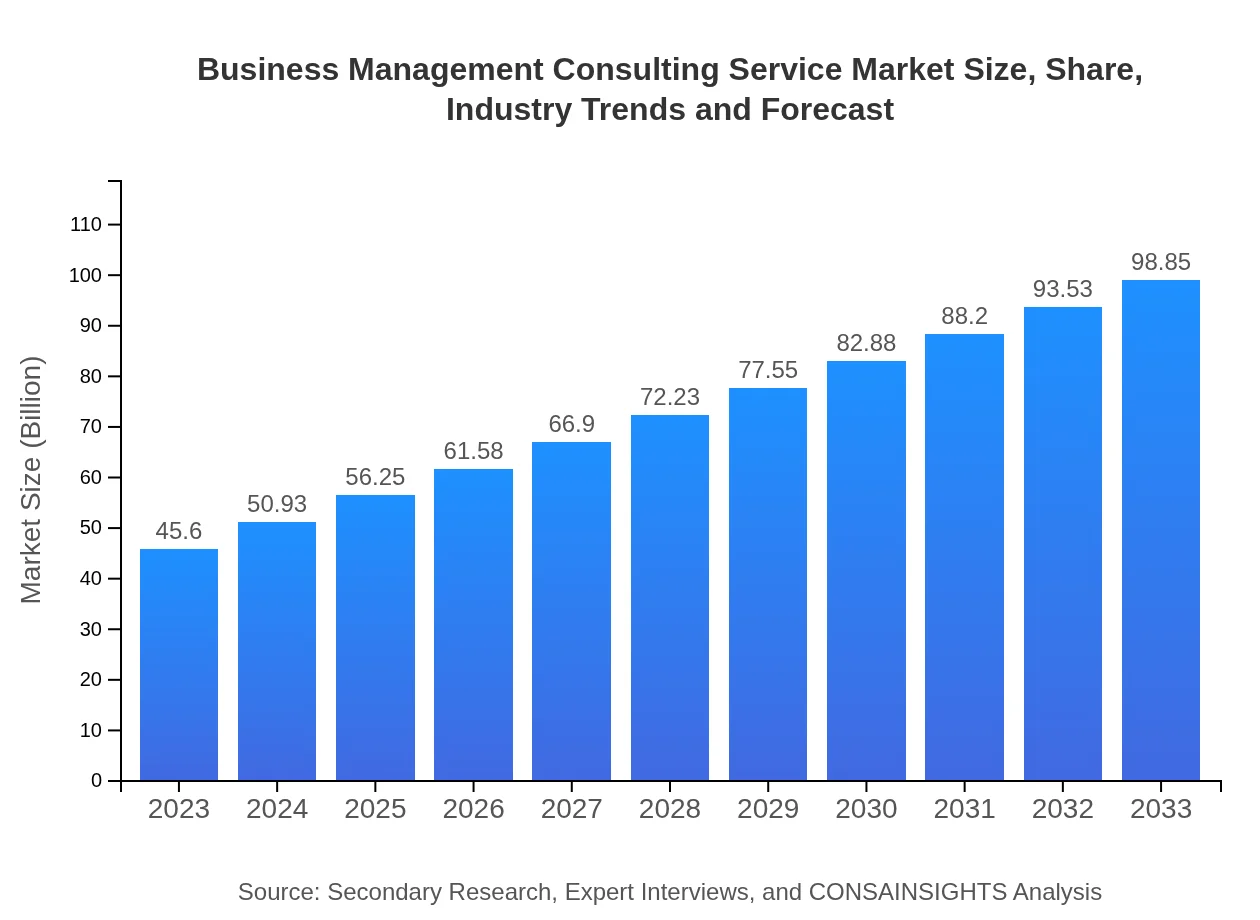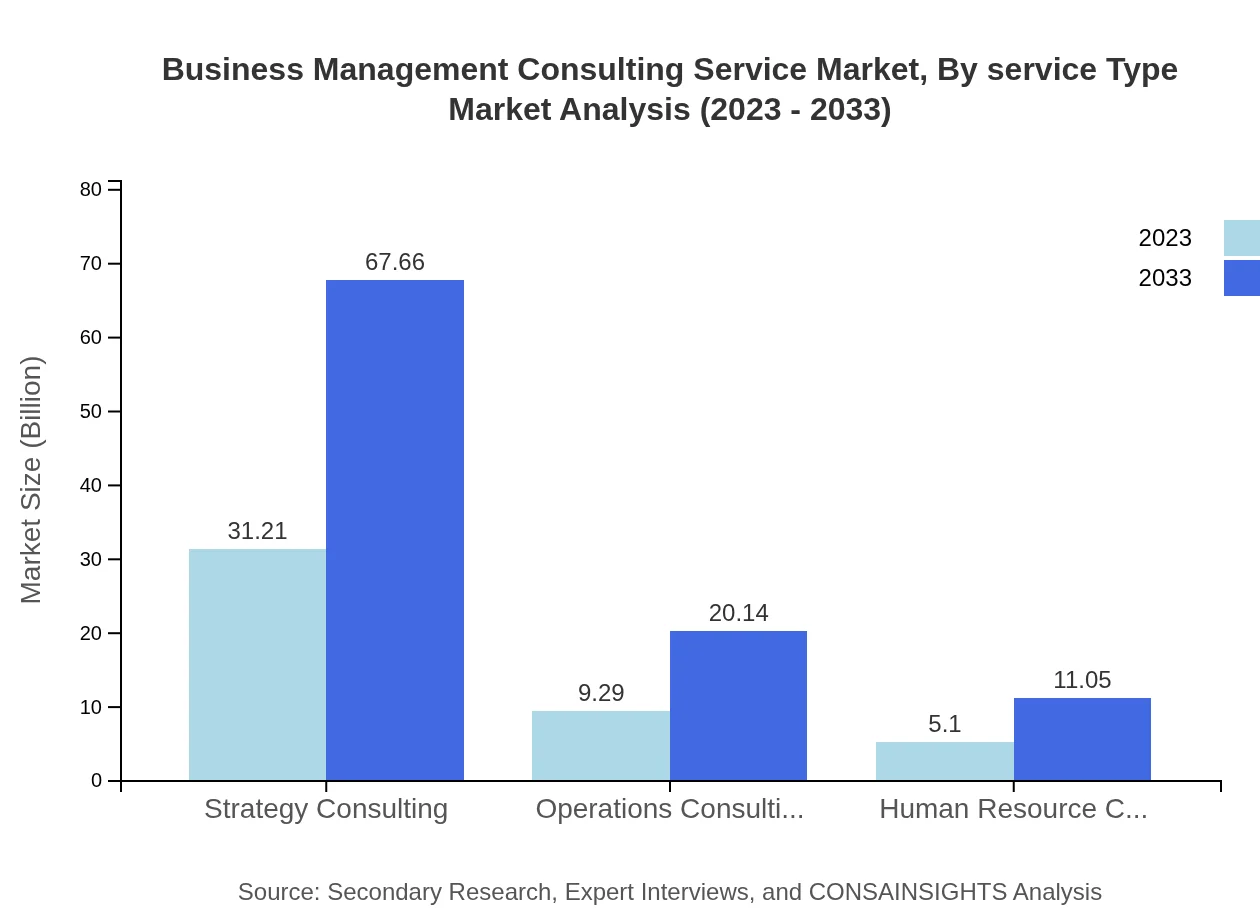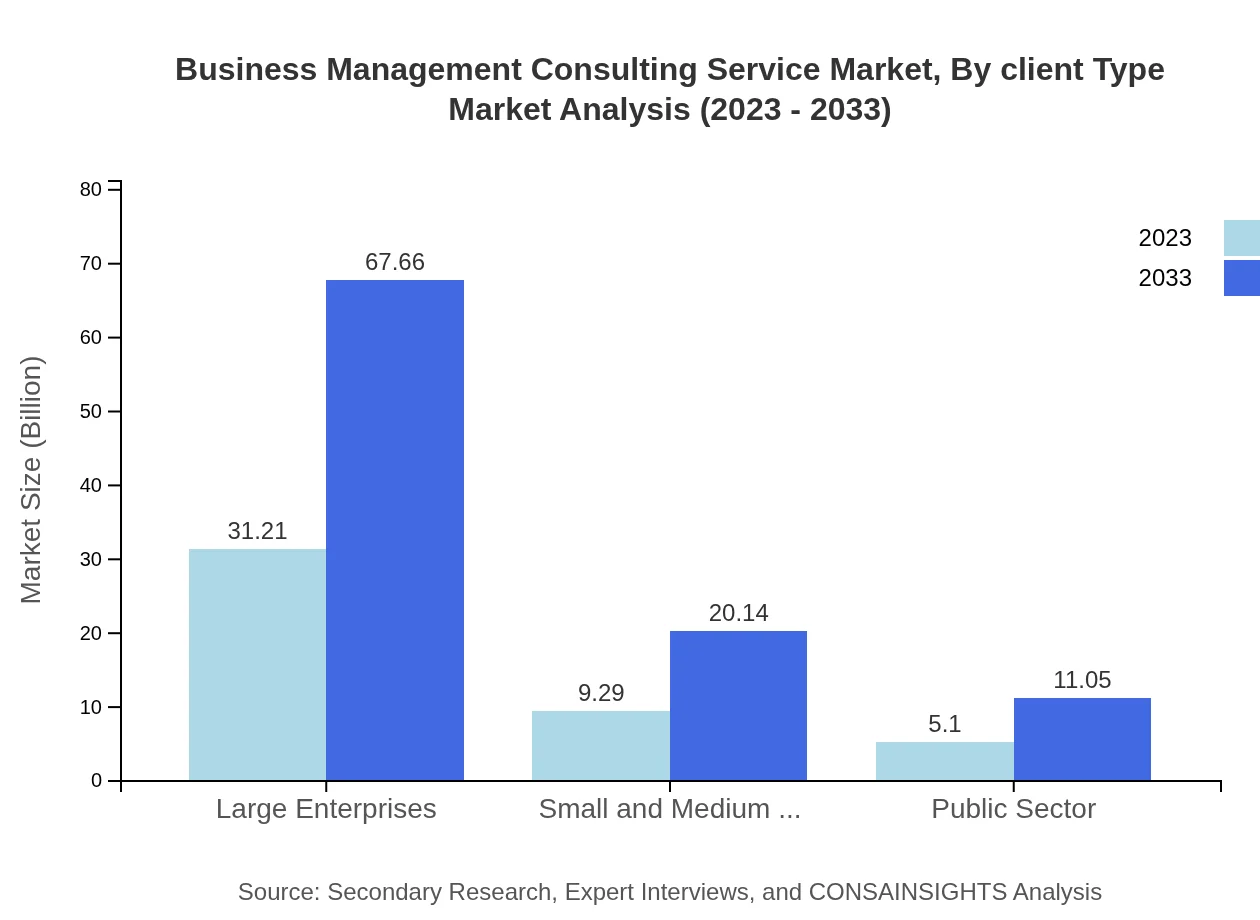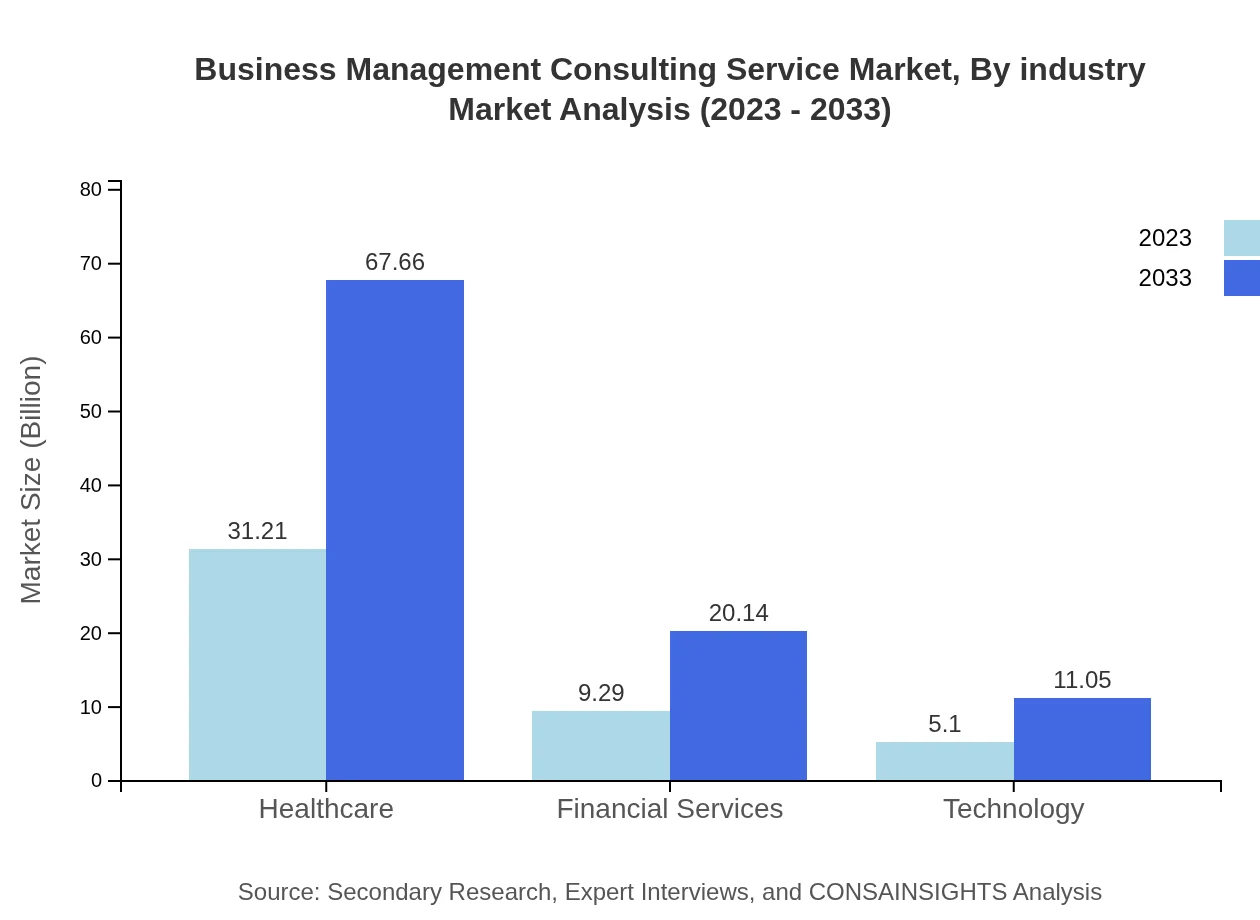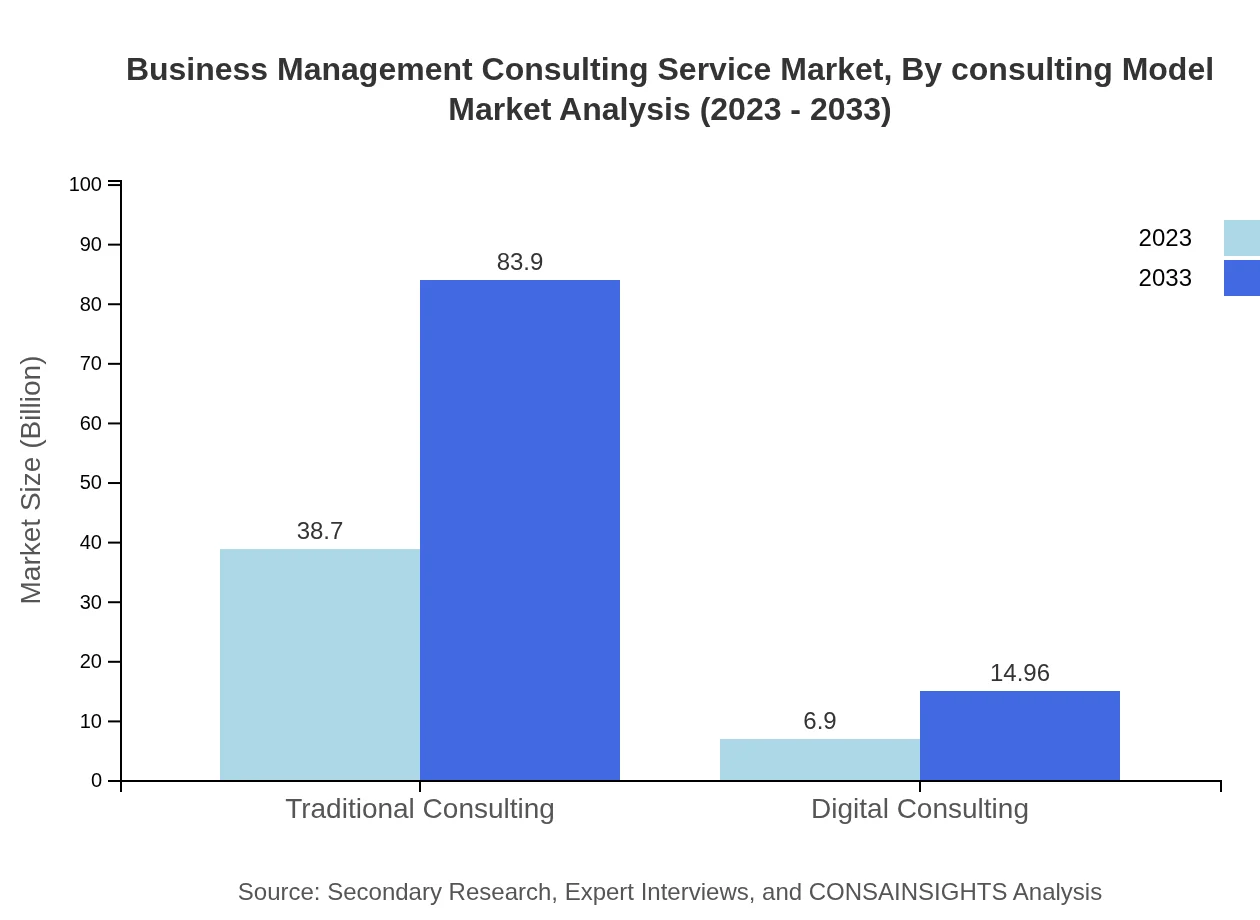Business Management Consulting Service Market Report
Published Date: 31 January 2026 | Report Code: business-management-consulting-service
Business Management Consulting Service Market Size, Share, Industry Trends and Forecast to 2033
This report provides an in-depth analysis of the Business Management Consulting Service market from 2023 to 2033. Insights include current market dynamics, industry trends, segmented analysis, and projections influencing growth metrics, allowing stakeholders to make informed decisions.
| Metric | Value |
|---|---|
| Study Period | 2023 - 2033 |
| 2023 Market Size | $45.60 Billion |
| CAGR (2023-2033) | 7.8% |
| 2033 Market Size | $98.85 Billion |
| Top Companies | McKinsey & Company, Boston Consulting Group (BCG), Bain & Company, Deloitte Consulting LLP, Accenture |
| Last Modified Date | 31 January 2026 |
Business Management Consulting Service Market Overview
Customize Business Management Consulting Service Market Report market research report
- ✔ Get in-depth analysis of Business Management Consulting Service market size, growth, and forecasts.
- ✔ Understand Business Management Consulting Service's regional dynamics and industry-specific trends.
- ✔ Identify potential applications, end-user demand, and growth segments in Business Management Consulting Service
What is the Market Size & CAGR of Business Management Consulting Service market in 2023 and 2033?
Business Management Consulting Service Industry Analysis
Business Management Consulting Service Market Segmentation and Scope
Tell us your focus area and get a customized research report.
Business Management Consulting Service Market Analysis Report by Region
Europe Business Management Consulting Service Market Report:
The European market is anticipated to grow from $16.32 billion in 2023 to $35.38 billion in 2033. Increased regulatory compliance and a focus on sustainability are among the key drivers for consulting services in this region, particularly in Germany and the UK.Asia Pacific Business Management Consulting Service Market Report:
The Asia Pacific region saw a market size of $8.12 billion in 2023 and is projected to reach $17.60 billion in 2033. The rise of SMEs and digitalization in countries like India and China is driving this growth, as firms seek consulting services to navigate complex business environments.North America Business Management Consulting Service Market Report:
In North America, the market stood at $14.74 billion in 2023, projected to nearly double to $31.96 billion by 2033. The U.S. and Canada’s advanced corporate landscape and demand for strategic advisory underscore rapid growth in this market.South America Business Management Consulting Service Market Report:
South America’s market was valued at $1.94 billion in 2023, expected to grow to $4.21 billion by 2033. Economic reforms and the need for modernization are creating opportunities for consultancy, particularly in Brazil and Argentina.Middle East & Africa Business Management Consulting Service Market Report:
The Middle East and Africa recorded a market size of $4.48 billion in 2023, expected to grow to $9.71 billion by 2033. The growth factor is attributed to economic diversification efforts in the Gulf states and investment in infrastructure-driven projects.Tell us your focus area and get a customized research report.
Business Management Consulting Service Market Analysis By Service Type
The Business Management Consulting Services Market is largely driven by strategy consulting, which is expected to grow from $31.21 billion in 2023 to $67.66 billion in 2033. Operations consulting and digital consulting also show significant growth, with respective market sizes of $9.29 billion and $6.90 billion in 2023, projected to expand to $20.14 billion and $14.96 billion by 2033.
Business Management Consulting Service Market Analysis By Client Type
Large enterprises dominate the consulting landscape, with a market size of $31.21 billion in 2023 and a forecast of $67.66 billion by 2033. In contrast, small and medium enterprises represent a growing segment, expanding from $9.29 billion to $20.14 billion over the same period.
Business Management Consulting Service Market Analysis By Industry
The healthcare sector leads the market with an impressive size of $31.21 billion in 2023, set to double to $67.66 billion by 2033. The financial services segment is forecasted to grow steadily from $9.29 billion to $20.14 billion, contributing immensely to the overall growth.
Business Management Consulting Service Market Analysis By Consulting Model
Traditional consulting remains strong with a size of $38.70 billion in 2023, growing to $83.90 billion by 2033, while digital consulting, though smaller, is gaining traction, rising from $6.90 billion to $14.96 billion.
Business Management Consulting Service Market Trends and Future Forecast
Tell us your focus area and get a customized research report.
Global Market Leaders and Top Companies in Business Management Consulting Service Industry
McKinsey & Company:
Undoubtedly one of the most prestigious consulting firms globally, McKinsey provides strategic advice to corporations across multiple industries, leveraging deep analytical insights and industry expertise.Boston Consulting Group (BCG):
BCG specializes in growth strategy and innovation consulting, helping clients manage complex challenges through data-driven solutions.Bain & Company:
Bain focuses on transforming sales and marketing functions for leading companies and offers insight-driven strategies for sustainable growth.Deloitte Consulting LLP:
Anchored by its strong brand, Deloitte offers a full suite of consulting services, ranging from strategy and operations to human capital consulting.Accenture:
Accenture harnesses technology and digital capabilities to lead transformation across sectors including healthcare, finance, and technology, focusing heavily on sustainable and inclusive growth.We're grateful to work with incredible clients.









FAQs
What is the market size of business Management Consulting Service?
The global business management consulting service market was valued at approximately $45.6 billion in 2023 and is projected to grow at a compound annual growth rate (CAGR) of 7.8%, indicating a strong upward trend in the industry's financial health and relevance.
What are the key market players or companies in this business Management Consulting Service industry?
Key players in the business management consulting service industry include Deloitte, McKinsey & Company, Bain & Company, Accenture, and Boston Consulting Group, each contributing to the growth and innovation within the sector through their diverse offerings.
What are the primary factors driving the growth in the business Management Consulting Service industry?
Growth factors in this industry include increasing demand for digital transformation, the necessity for strategic planning in competitive markets, enhancing operational efficiency, and evolving government regulations, all pushing organizations to seek expert consulting services.
Which region is the fastest Growing in the business Management Consulting Service?
The fastest-growing region in the business management consulting service market is Europe, with projected market growth from $16.32 billion in 2023 to $35.38 billion in 2033, emphasizing a significant shift towards consulting services in this region.
Does ConsaInsights provide customized market report data for the business Management Consulting Service industry?
Yes, ConsaInsights offers tailored market report data for the business management consulting service industry, enabling clients to obtain specific insights that align with their unique business requirements and strategic goals.
What deliverables can I expect from this business Management Consulting Service market research project?
Deliverables include comprehensive market analysis, data visualization dashboards, competitor profiling, market segment insights, trends analysis, and actionable recommendations based on current and forecasted market conditions.
What are the market trends of business Management Consulting Service?
Market trends in business management consulting include a shift towards digital and remote consulting services, emphasis on sustainability practices, increased focus on data-driven decisions, and the rise of integrated consulting services addressing multifaceted business challenges.

